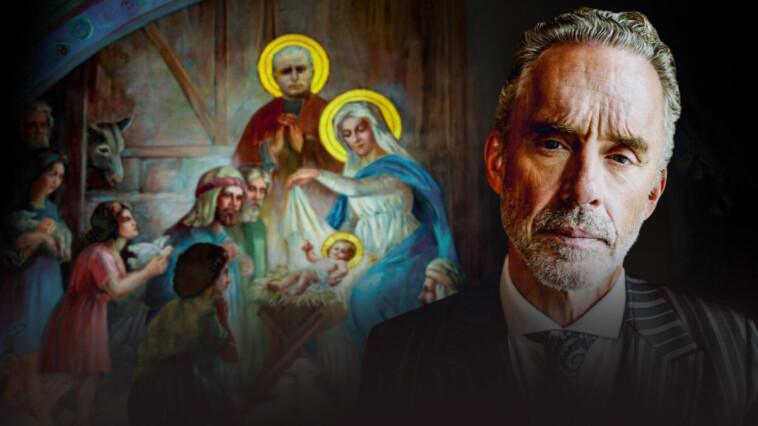Born into lowly circumstances, he came without fanfare, without flair, without majesty of royalty. Yet his coming fulfilled Old Testament prophecies that pronounced God would send a savior for the world — for every individual in every subsequent time period in every society. The birth story of Jesus has transcended time, and Dr. Jordan B. Peterson’s series, “The Gospels,” is evidence of that transcendence.
To examine the birth of Jesus Christ is to assess the nativity story itself. Peterson and the scholars who join him at the table to read the words of the narrative that begins Jesus’ life and mission take up the task of expository discussion: They analyze the story’s personal and cultural implications, evaluate its historical and political context, and address how it applies to us today. The nativity story continues to draw us in, sometimes in ways we simply cannot explain — try as we might.
WATCH JORDAN B. PETERSON’S SERIES, “THE GOSPELS,” ON DAILYWIRE+
Mary and Joseph: Personal and Cultural Significance
“And, behold, thou shalt conceive in thy womb, and bring forth a son, and shalt call his name Jesus. He shall be great, and shall be called the Son of the Highest: and the Lord God shall give unto him the throne of his father David: And he shall reign over the house of Jacob for ever; and of his kingdom there shall be no end.” Luke 1:31-33
The birth story of Jesus involves several visits from angels: to Mary, with news of her pregnancy; to Joseph, in a dream with instructions to marry Mary; to shepherds, in a field with directives to find the baby. The greatest of stories, Jordan has said before, omit everyday, common material, but they include excitement — just as the Gospels exclude extraneous details around these angel visits. But the day-to-day happenings were still going right on in these people’s lives. By the time the angel visits Joseph, Mary has somehow already told him, even though they would have been supervised at all times. How? When? Afterward, Joseph had “considered these things,” but what, exactly, was he thinking? What overwhelming news this would have been for them both.
Yet even in the midst of immensely life-changing, supernatural news, Mary “says ‘yes’ to the fact of the child,” Jordan notes. “There isn’t a deeper reflection of fundamental faith in the goodness of being and becoming than the decision a woman takes to throw herself wholeheartedly and without reservation into the relationship with her infant.” On a personal level, Mary embodies great faith in motherhood. More broadly, Mary’s attitude reflects that of a healthy culture: one that holds the image of mother and infant sacred. Without the values of maternal love, life, continuity, and sacrifice, a culture has no future.
So, too, does Joseph accept the angel’s directions without question. This is not because the Gospels shy away from addressing doubt and disbelief, as Gregg Hurwitz points out. After all, “How much can you spring on one person at once?” Jordan posits. Joseph had resolved to send Mary away quietly, but he, instead, pushes any doubt or disbelief aside. Like Mary’s, Joseph’s faith as an individual is evident. But on a cultural level, his willingness to act in good faith creates a solid foundation for the family.
The Birth of Jesus: Historical and Political Significance
“For unto us a child is born, unto us a son is given: and the government shall be upon his shoulder: and his name shall be called Wonderful, Counsellor, The mighty God, The everlasting Father, The Prince of Peace.” Isaiah 9:6
Context always matters — always. The time of Jesus’ birth is unmistakably significant to his life’s mission, which the group discusses at length. At his birth, the Roman emperor Caesar Augustus had come to be known as Divi Filius, a Latin phrase meaning “son of a god.” This is an undeniable mark of a hero story: the genuine God is born during a false god’s tyrannical rule. At the same time, many historians consider Augustus one of the greatest leaders in history. He is responsible for establishing the Pax Romana, a 200-year period of peace. During his reign and the years following, the Romans did not rebel and no outside forces attacked Rome. Considering this period of stability, Jesus is auspiciously born into a time his mission can be most fruitful. Undoubtedly, the Christian message was able to spread with astonishing speed.
The true emperor where true peace will be found is born into a hidden location, and his coming is not announced to the masses. It is announced to those who shared a specific relationship with the prophets of the Old Testament: shepherds. But the choice of shepherds is significant beyond even the prophetic; it is significant in regards to the universal. The shepherds to whom the angel delivers the birth announcement would have been considered lowly because of their socioeconomic status. Christ’s birth, his mission, his salvific nature is universally salvific, intended for everyone.
WATCH JORDAN B. PETERSON’S SERIES, “THE GOSPELS,” ON DAILYWIRE+
Accompanying the angel who delivers the birth announcement to the shepherds comes “a company of the heavenly host” (Luke 2:13). The Hebrew defines this heavenly host as an “army.” Bishop Barron reminds the group that though emperors dominate the world with human armies, Christ will have ultimate dominion with a fierce, angelic, supernatural army.
The Heavenly Host: Spiritual and Universal Significance
“For unto you is born this day in the city of David a Saviour, which is Christ the Lord.” Luke 2:11
What does this nativity story tell us about today? About ourselves? About this life — and the next? It tells us that Jesus — the giver of personal peace and worldly peace to come — brings hope, and he intended us to carry that eternal hope with us.
The host of angels and shepherds signify the fullness of universal reconciliation: two extremes, above and below, connected together through Christ’s birth. Their angelic message proclaims, “Glory to God in the highest, and on earth peace, good will toward men.” Jesus’ mission was to bring true peace, reconciling man to God through his eventual sacrifice. When glory is given to God, as Bishop Barron explains, peace suffuses personally, culturally, and universally.
It is a story for us, one with the hope of peace and the promise of life.



